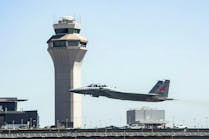Mar. 15—ST. LOUIS COUNTY — One of the region's most important assembly lines took another hit from abroad Monday.
Germany said it would buy 35 Lockheed Martin F-35 fighter jets and use upgraded European-made fighters to do jobs it once reserved for Boeing F/A-18 Super Hornets. Boeing had banked on German orders of Super Hornets and Growlers, their electronic warfare variants, to keep busy thousands of workers north of Lambert Field and across the country.
"It feels like the market for the Super Hornet is gradually eroding," said Loren Thompson, a longtime defense industry consultant and executive with the Lexington Institute. "That probably means Boeing will need Congress to keep the line viable."
Washington has already extended the Super Hornet line years beyond expectations. And in a statement Monday, the company said it remains confident in "the next generation capabilities and unique value proposition" its planes have to offer.
Introduced in the 1990s, the Super Hornet is Boeing's all-purpose naval workhorse, built to live on a carrier deck and handle any mission thrown at it, from dogfights and airstrikes to refueling planes midair. Over the past two decades or so, Congress has put more than $50 billion toward nearly 700 planes.
But Navy officials are increasingly insisting on putting more of their limited resources into developing their next-generation fighter, and they've been looking for money in the Super Hornet program. And since the F-35 became available, it's become the favorite of foreign allies.
Germany bucked that trend two years ago with announcement of plans to buy Super Hornets. But it was a political decision: Germany and France were working together on their own next-generation jet, and France had made clear to Germany that buying the F-35 could torpedo the effort.
Since then, though, more and more Western allies have chosen the F-35. Then Germany installed a new leader, triggering a review of the Super Hornet buy. And when Russia invaded Ukraine, new German Chancellor Olaf Scholz promised a huge defense buildup in response, including the newer, stealthier F-35, and also the next-generation program.
Boeing continues to pursue a deal in India. Back home, it appears to have convinced Congress to direct the Navy to buy a few more Super Hornets over admirals' objections in this year's defense budget, which may continue as war in Europe boost U.S. defense spending.
"I'm sure they can keep that going for a few more years," said Richard Aboulafia, managing director at AeroDynamic Advisory.
Still, while Boeing has defied the odds on Capitol Hill for years, lobbying there isn't getting any easier. Navy leaders have publicly opposed new Super Hornets, saying they don't see any practical use for them past the 2030s.
And the foreign sales keep falling through, too.
"The strategy," said Thompson, the longtime defense industry consultant, "is coming unraveled here."
___
(c)2022 the St. Louis Post-Dispatch
Visit the St. Louis Post-Dispatch at www.stltoday.com
Distributed by Tribune Content Agency, LLC.


